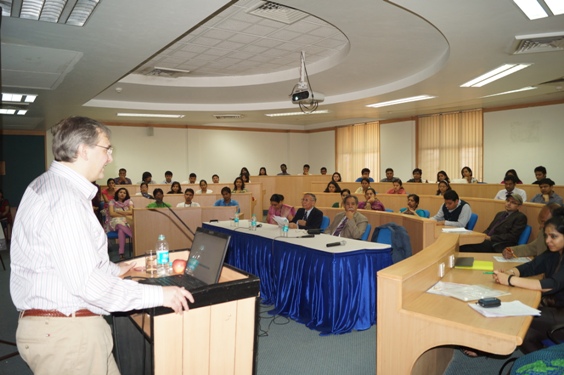08 Mar 2013|Noida | Amity University Campus, Sector-125 Noida
Dr. Jonathan Foster - University of Sheffield, UK delivers lecture on “Collective Intelligence: Prospects and Pitfalls" at Amity University

Dr. Jonathan Foster, Lecturer in Information Management- PhD Information Studies, University of Sheffield, UK delivered a lecture on the topic “Collective Intelligence: Prospects and Pitfalls" at Amity University campus, sector-125 Noida.
Delivering the lecture Dr. Foster explained the use of internet-based information aggregation mechanisms such as wikis, open source, blogs and prediction markets as a way of improving individual, group and organizational decision-making. While addressing the students of Amity University, Dr. Foster said that we are living in the era of network information economy and we all are influenced in our decision making capabilities with the opinions broadcast on online platforms like wiki, blogs or social media websites. Elaborating on the topic, Dr. Foster said that in network information economy, consumer plays a role of critique, creator, receiver, publisher after joining different social networks. Choosing what to read, what movie to watch, where to go depends on what kind of information in the form of reviews, ratings, opinion are received by us. This is also called as collective intelligence.
Dr. Foster said that the decision making sense should not be influenced by online network information; rather it should be based after the consulting with family and friends. Dr. Foster added that there are number of occasions when small groups in online media gave unreliable information biased or tilted towards one angle only and added that sometimes group may fall into information cascading affect in which group often decides an opinion on information collected by all instead of information received by few. The information received by all is common and may ignore information by few which may be important and critical. For example in Share market, sometimes prices of share collapse just on the information shared by groups. Dr Foster also made the difference between proprietary information goods and non-proprietary information goods. The goods which have proprietary rights can be used only by license or subscription holder. For example Apple computer products, Times of India Newspaper etc., whereas non-proprietary information goods can be used by general public like linux open source softwares, online newspapers etc. While summing up his lecture Dr. Foster said that Network Information Economy is very huge and is beyond normal economy of a country.
Students from Amity Institute of Competitive Intelligence and Strategic Management, Amity Institute of Information Technology, Amity School of Engineering & Technology were present during the lecture session.
Dr. Jonathan Foster also visited Amity Innovation Incubator, Amity University online and various infrastructure of Amity University Uttar Pradesh.